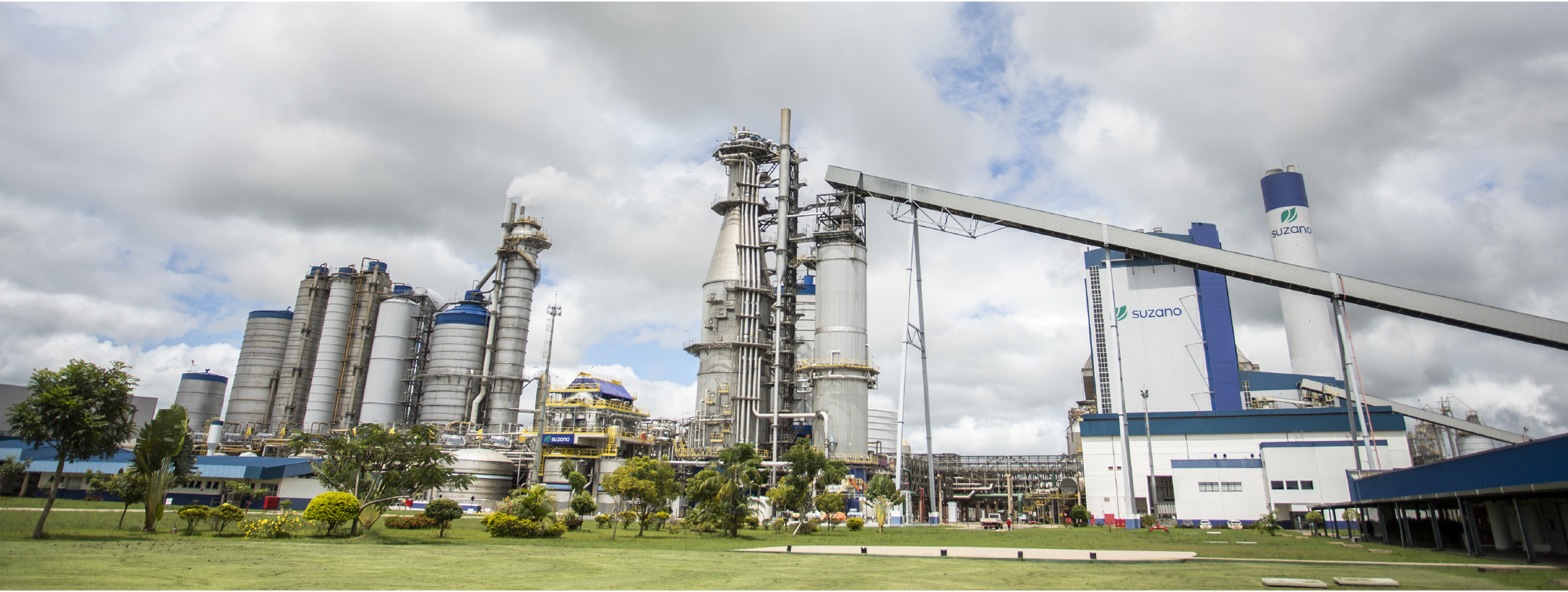Investor
relations
GRI 103-1, 103-2, 103-3
GRI 103-1, 103-2, 103-3
Associated material topics:

Suzano is recognized by the Market for its solid and robust governance and clear and transparent communication with its investors. In 2020, the company advanced the ESG agenda, and led important movements in sustainable finance.

Suzano’s high standards of corporate governance is a determining factor for a company that seeks to lead the movements towards the future of the forestry industry, the sector, and society. In 2020, the ethical, upstanding, and transparent performance of our Board of Directors, guided by consistent policies and the vast knowledge of supporting committees, allowed the company to successfully endure one of humanity’s most challenging periods.
We started the year committed to completing the integration of the operations of former Fibria and Suzano Papel e Celulose, which contributed to the company achieving excellent cost reduction, despite the enormous pressure in an atypical year for business. The combination of high volumes and controlled costs, coupled with the depreciation of the Brazilian currency (BRL), led Suzano to achieve a very positive performance in terms of cash generation. We managed to reduce our net debt by more than US$1 billion over the year.
The advances in 2020 are also reflected in some unprecedented initiatives, such as the launch of our first Sustainability-Linked Bond, with which Suzano obtained the lowest rates in its history in external funding. Also, we were recognized by the prestigious Dow Jones Sustainability Index – Emerging Markets (DJSI Emerging Markets) and B3’s Corporate Sustainability Index 2021 (ISE).
In 2020, despite the pandemic, Suzano continued to evolve and improve its corporate governance. In this sense, the company’s governance structure maintained its structure with a Board of Directors, supported by an Audit Committee, the Executive Board, and five other advisory committees. The Board of Directors has seven independent members, including two women. To learn more about the composition of these bodies and their respective roles, visit the Indicators Center or the Investor Relations website.

High levels of governance require careful risk management. At Suzano, this management is supported by three complementary fronts, committed to avoiding or reducing the likelihood of risks occurring in the different areas of the business. We have an Integrated Risk Management policy that applies to all areas. This policy defines the criteria for identifying, analyzing, treating, and monitoring these risks, taking into account the internal and external contexts when assessing risks. Those risks defined as priority and their respective action plans are monitored by the Executive Board, the Statutory Audit Committee, and the Board of Directors. For 2021, our priority is to launch our New Compliance Program, based on the nine elements (tone at the top, risk assessment, regulatory follow-up, policies and procedures, training and communications, third-party management, monitoring, consequence management, and reporting) and on our Compliance Guardian Program. To learn more about the company’s risk management structure and initiatives to fight corruption, visit the Investor Relations website and the Indicators Center.
Suzano has instruments in place that guide the ethical management of its business. Among them, we have the Code of Conduct, the Ombudsman Policy, the Disciplinary Measures Policy, and the Rules of the Conduct Committee, which establish the guidelines of the company’s governance process. All of these documents deal with compliance with legal and normative provisions applicable to the area and to the Ombudsman’s Channel, as well as with the corresponding regulations, including specific procedures and confidentiality of information. These rules are intended to protect the person who, in good faith, files reports in order to preserve the company’s ethical principles, ensuring non-retaliation.
The Ombudsman Channel is a confidential, independent channel offered to internal and external audiences to answer questions and forward reports and complaints about issues that may violate our Code of Conduct.
Activity is conducted by an independent contractor and guarantees confidentiality, if requested by the whistleblower. Receipt and control of the claims, via internet, are available 24/7, and access can be obtained through any computer, tablet, or cellphone (with internet), by clicking here.
The channel is valid for the company’s operations in Brazil and in all other regions worldwide where we have offices.
The information is collected by competent persons and areas in an autonomous and impartial manner in order to identify the validity and applicability of the necessary measures, and no form of retaliation against the whistleblower is allowed or condoned. To find out more about the indicators associated with Suzano’s Ombudsman Channel, access the Indicators Center.
Complaints received
and addressed
in 2020:
912

Complaints
already resolved
during this period:
870

In 2020, Suzano released its Long-Term Goals and took them a step further: Suzano became the second company in the world, and the first in the Americas, to link one of its public commitments to the company’s debt management. In a record 3-week time period, the company put together the issuance of its first Sustainability-Linked Bond (SLB), a security in which the cost of financial resources is tied to one (or more) environmental and/or social goals. In the case of Suzano, the issuance of the security was linked to the goal of reducing the intensity of greenhouse gas emissions (GHGs) by 15% by 2030, which is equivalent to 0.181 tCO₂e/t of product. To materialize its SLB, however, the company needed to set an intermediate target: 0.190 tCO₂e/t of product (pulp and paper, -10.9%) by 2025, when the company will be halfway toward achieving the original goal, with the debt maturing on January 15, 2031.
Suzano went to the market twice: on September 10, when it raised US$750 million, and on November 16, when it reopened negotiations and raised another US$500 million. In both instances, it obtained the lowest interest rates in its history in foreign loans of 3.95% and 3.1%, respectively, and a current coupon rate of 3.75%. In practice, this means that the sustainability component has reduced Suzano’s cost of money. Combined with the fact that there was a demand of US$7 billion in the first funding, equivalent to nine times the offering, and US$2 billion in the second funding, equivalent to four times the offering, these are signs of the soundness and credibility achieved by the company over the years.
If the company fails to reach the intermediate target, the interest rate will increase 25 base points as of the second half of 2025, which will raise the total rate to 4% per year. The average intensity of emission obtained in 2024 and 2025 will indicate whether the company has reached its target and, therefore, whether it will be financially penalized in this transaction.
In February 2021, we carried out another action that combines business and sustainability. We signed an export prepayment agreement in the form of a Sustainability Linked Loan (SLL) in the amount of US$1.57 billion. The credit operation has environmental performance indicators associated with targets for reducing the intensity of greenhouse gas emissions and reducing industrial water withdrawal, by 9.7% and 2.1%, respectively, by 2025. Both goals are aligned with the roadmap of the Long-Term Goal for Emissions: reduce specific emissions by 15% (Scope 1 and 2 emissions) by 2030.
The financing interest rate is equivalent to the Libor (London Interbank Offered Rate) +1.15% per year. The average term will be 60 months, with maturity in March 2027. If the company reaches the agreed upon goals, there will be a reduction of up to 0.02% per year in the contracted cost. The funds raised will be used for the early settlement of the US$1.67 billion principal of the export prepayment contract formalized as part of the funding structure for the payment of the merger with Fibria, completed in January 2019.
SLB has voluntary principles, which indicate the best practices for this type of structure. They are as follows: a suitable selection of performance indicators, their material relevance to the issuer’s business, adjustments to the goals, transparency, and reporting of operations. In addition to selecting a challenging goal related to climate change and meeting the instrument’s accounting, legal, and compliance demands, Suzano was a pioneer in developing a SLB framework: a unique and detailed document on sustainability issues related to the structure of the transaction. The framework was also submitted voluntarily for a second party opinion, made by ISS ESG.
The third-party opinion of ISS ESG gives issuers of green and social sustainability bonds a reliable and independent assessment of quality, in terms of the sustainability of their bonds. Suzano’s experience in issuing its first SLB is sound evidence of the trust investors have in the company’s ability to reduce its specific emission of greenhouse gases. It is also an incentive for the company to seek new opportunities in the field of sustainable finance. It is worth mentioning that some companies in Brazil followed the path pioneered by Suzano and also issued their first SLBs. This is proof that, in fact, sustainable finance is a trail of no return.
In October 2020, the National Economic and Social Development Bank (BNDES) sold its 150.2 million Suzano shares, equivalent to 11% of the company’s capital. Individual shares sold for R$46.00, totaling approximately R$6.9 billion. Most of those who bought the shares were not our shareholders, allowing for greater dispersion of our capital and a future increase in the liquidity of the shares, both on B3 and of our ADRs on the NYSE.
Our commitments to sustainability and the creation of long-term value are starting to be recognized by prestigious external evaluators, with relevant influence on the global ESG agenda. In 2020, Suzano was chosen to integrate the 2020-2021 portfolio of the Dow Jones Sustainability Index – Emerging Markets (DJSI Emerging Markets) and B3’s 2021 Corporate Sustainability Index (ISE).
The DJSI is composed of the top 10% of companies in each sector, among the 800 largest companies assessed in the 23 countries characterized as emerging markets. In addition to Suzano, only ten Brazilian companies are part of the new portfolios that integrate the DJSI family of indexes.
B3’s ISE, on the other hand, is a tool that analyzes the performance of companies listed on the stock exchange from a corporate sustainability, social justice, environmental balance, and corporate governance standpoint. Suzano is part of the current portfolio, effective until December 30, 2021, which is composed of 46 shares of 39 companies.

Suzano was the first company in the pulp and paper sector and the first non-financial company in Latin America to be featured in a case study by the Task Force on Climate-related Financial Disclosure. Launched in 2015, the TCFD Knowledge Hub, a page where initiatives related to TCFD recommendations are disclosed, has already posted 14 case studies, developed mainly by companies in the financial and non-financial sectors. In the case of Suzano, the highlight is the Indicators Center, a digital platform with information about the company, including financial data related to climate change, in line with the recommendations for measurement and transparency of results proposed by the TCFD.
In 2020, we joined the Carbon Disclosure Project (CDP) platform, which provides support to investors and governments in their decision-making process based on important information on risk management, opportunities, and social and environmental impacts. It is an initiative created to mobilize these parties in order to build and accelerate collaborative actions for viable development for current and future generations. The good news is that, in our first year, due to the methodology adopted by the organization, we scored a B in the three questionnaires answered on climate, water, and forests.